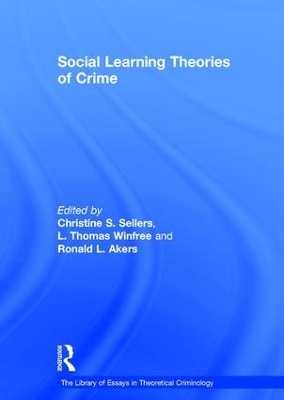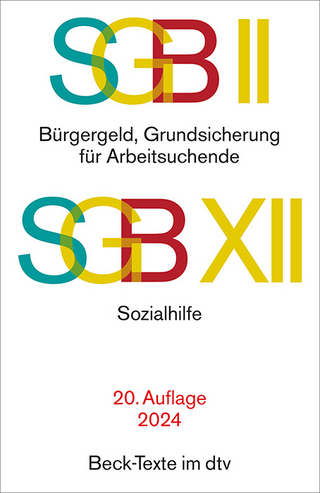
Social Learning Theories of Crime
Routledge (Verlag)
978-0-7546-2967-2 (ISBN)
The readings selected for this volume reveal the historical development of social learning theory, from its origins in differential association theory, through the role played by psychological behaviorism, to contemporary social learning theory and its further incorporation of social structure as the context within which criminal behavior is learned. The volume dispels common misunderstandings of the theory and emphasizes its foundations in both symbolic interactionism and behaviorism. At its core, the theory remains true to its origins in sociology, reflecting Sutherland's admonition that a complete learning theory must include macro- and micro-sociological processes. Besides conceptual treatments of the theory's development, the volume also presents data-based entries that convey the depth and breadth of social learning theory as an explanation of deviance. Social learning theory is demonstrated to be an explanation that spans the gamut of behaviors from gang activities to drug use to coercive sex to terrorism.
Christine S. Sellers is Associate Professor of Criminology, University of South Florida, L.Thomas Winfree, Jr is Professor of Criminal Justice, New Mexico State University and Ronald L. Akers is Professor of Criminology and Sociology at the University of Florida
Contents: Introduction; Part I Differential Association Theory: A statement of the theory, Edwin Sutherland; Epidemiology and individual conduct: a case from criminology, Donald R. Cressey; Criminality theories and behavioral images, Daniel Glaser. Part II Behavioral and Cognitive Learning: Behaviorism at fifty, B.F. Skinner; Criminal behavior and learning theory, C. R. Jeffery; Behavior theory and the models of man, Albert Bandura. Part III Social Learning Theory: Theoretical Statements and Responses to Critiques: A differential association-reinforcement theory of criminal behavior, Robert L. Burgess and Ronald L. Akers; A social learning perspective on deviant behavior, Ronald L. Akers; The dynamics of delinquent peers and delinquent behavior, Ross L. Matsueda and Kathleen Anderson; Is differential association/social learning cultural deviance theory?, Ronald L. Akers. Part IV Empirical Tests of Social Learning Theory: Social learning and deviant behavior: a specific test of general theory, Ronald L. Akers, Marvin D. Krohn, Lonn Lanza-Kaduce and Marcia Radosevich; Parental and peer influences on adolescent drug use in Korea, Sunghyun Hwang and Ronald L. Akers; Do adolescents engage in delinquency to attract the social attention of peers? An extension and longitudinal test of the social reinforcement hypothesis, Cesar J.Rebellon; The empirical status of social learning theory: a meta-analysis, Travis C. Pratt et al. Part V The Group Context of Social Learning Theory: Social contexts and social learning in sexual coercion and aggression: assessing the contribution of fraternity membership, Scot B. Boeringer, Constance L. Shehan and Ronald L. Akers; Social learning theory, self-reported delinquency, and youth gangs: a new twist on a general theory of crime and delinquency, L. Thomas Winfree Jr, Teresa Vigil Bäckström and G. Larry Mays; Extending the boundaries of social structure/social learning theory: the case of suicide bombers in Gaza, L. Thomas Winfree and L. Keith Akins. Part VI Social Learning and Social Structure: Social structure and social learning in crime and deviance, Ronald L. Akers; Social learning and social structure: reply to Sampson, Morash, and Krohn, Ronald L. Akers; Gang membership, drug selling, and violence in neighborhood context, Paul E. Bellair and Thomas L. McNulty; Name index.
| Erscheint lt. Verlag | 15.3.2012 |
|---|---|
| Reihe/Serie | The Library of Essays in Theoretical Criminology |
| Verlagsort | London |
| Sprache | englisch |
| Maße | 174 x 246 mm |
| Gewicht | 2450 g |
| Themenwelt | Recht / Steuern ► Allgemeines / Lexika |
| Recht / Steuern ► Arbeits- / Sozialrecht ► Sozialrecht | |
| Recht / Steuern ► EU / Internationales Recht | |
| Recht / Steuern ► Strafrecht ► Kriminologie | |
| Sozialwissenschaften | |
| ISBN-10 | 0-7546-2967-8 / 0754629678 |
| ISBN-13 | 978-0-7546-2967-2 / 9780754629672 |
| Zustand | Neuware |
| Haben Sie eine Frage zum Produkt? |
aus dem Bereich


